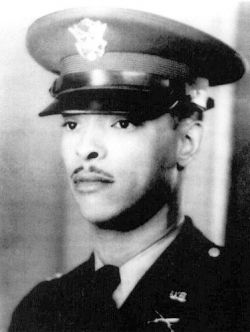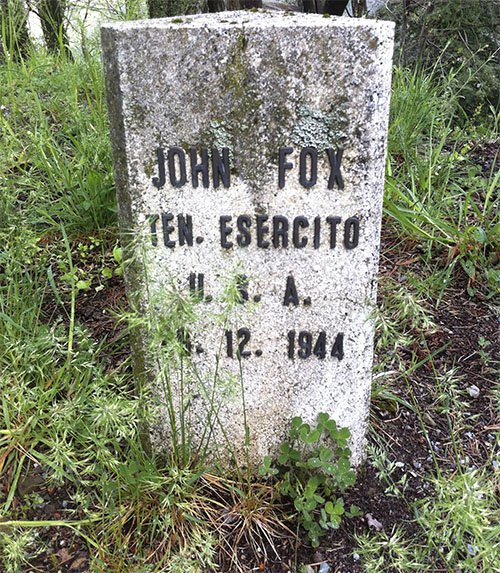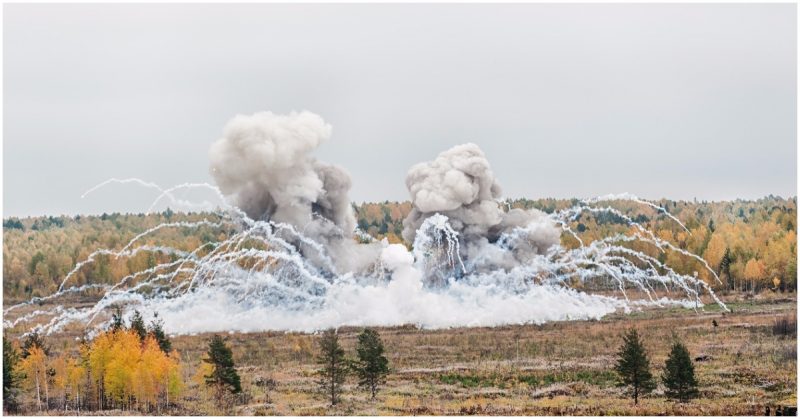Often in war, gallant men will embrace what seems like certain death to accomplish the mission. Perhaps in the back of their minds, there is a glimmer of hope they can survive what they are about to do.
However, those who survive will regularly account in history that their death was presupposed in their actions. Then there is a rare group of men who would personally ask for death over the radio from friendly forces.

When First Lieutenant John Fox volunteered to stay behind and cover his unit’s retreat from an overwhelming German army in Italy, he likely considered death as an option. Calling in firepower to combat the Germans he did his worst upon them until numerical superiority made more resistance futile. Looking down and seeing the mass of German forces in the streets Fox got on the radio and made the call few could have made. He called in artillery on his own position. Acknowledging he knew what it meant, he repeated the order and American steel began to rain down. When a counter-attack recovered the area, the Americans found John Fox’s body in the rubble along with over 100 German soldiers. For his actions that day and after a long road, John Fox eventually was awarded the Medal of Honor.
A Life of Service
John R. Fox was born on May 18, 1915, in Cincinnati, Ohio to an African-American family. Just a few years after his birth, African-Americans were thrown into the fight in WWI. Unfortunately, the policies in the military mirrored many of those back on the homefront, and African-Americans were often forced into segregated roles. It did not deter Fox from service, and while attending Wilberforce University, he jumped at the opportunity to join the ROTC.
Fortunately for Fox, he studied under the tutelage of Aaron R. Fisher. An African-American military hero in his own right, Fisher received the Distinguished Service Cross and Croix de Guerre for his actions during WWI. With such a high bar set by his instructor, Fox entered the war with an exceptional example in mind.
Graduating from Wilberforce University, Fox was commissioned a 2nd Lieutenant. He subsequently joined the 92nd Infantry Division also known as the Buffalo Soldiers. The segregated unit had African-American soldiers led by African-American officers of which Fox was a famed member. By 1944, Fox was part of the 366th Infantry Regiment slugging it out with the Germans in Italy. Unfortunately for the Germans, they were about to encounter a man remarkably willing to give all for the sake of the mission.
Making the Hard Call
On December 25, John Fox was serving as a forward observer in the Italian mountaintop town of Sommocolonia. That evening, Germans in civilian clothing started to infiltrate the village for an upcoming assault. Just before dawn on the day after Christmas, the Germans unleashed a barrage of mortar and artillery fire on the location. Unbeknownst to Fox, the action was part of a broader German offensive across the Italian front. When an overwhelming number of German troops began to flood the town, the Americans were forced to retreat. Fox, on the other hand, had a difficult decision to make. He could withdraw, or he could continue to do his job. Fox chose the latter.
With just a handful of men with him, Fox called in firepower upon the Germans. First calling in a smoke mission to cover the retreat of his men, he then began to draw the artillery fire closer and closer to his position. From his vantage point of a second story window, Fox was able to bring down accurate fire and adjust his target with ease. He was also able to observe the reality of his situation as hundreds of Germans poured into the streets around him.
Having not yet been observed, Fox then made the call few could have. On the radio, Fox ordered the artillery fire to strike his exact position. With hundreds of Germans below him, Fox knew the impact such a strike would have and a better chance of survival it would give his men. The soldier on the other end of the radio at first refused, but Fox insisted. Indicating he knew what it meant, Fox again called for a massive barrage on his position. Reluctantly, the American artillery force obliged.

A Rightful Honor
When the Americans eventually retook the town sometime later, they discovered Fox’s body in a pile of rubble. With him were over 100 dead German soldiers. His act of courage had taken a heavy toll on the enemy and saved the lives of countless Americans. For his actions that day, recognition would have to wait. Due to the racial complexities of America at the time, many African-American soldiers were often denied the proper credit for such inexplicable acts. It was not until 1982 that he was awarded the Distinguished Service Cross, although that was still far short.
In the 1990’s a review of US military service records was undertaken to ensure race did not deny proper honors. The evaluators came across the story of John Fox. The story of a man who selflessly stayed behind to do his job and who got on a radio to ask for certain death to complete the mission.
In January of 1997, 1st Lieutenant John Fox’s Distinguished Service Cross was upgraded to the Medal of Honor ensuring his rightful place in military history.
